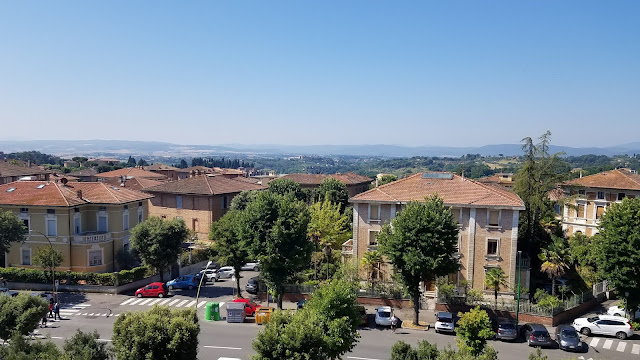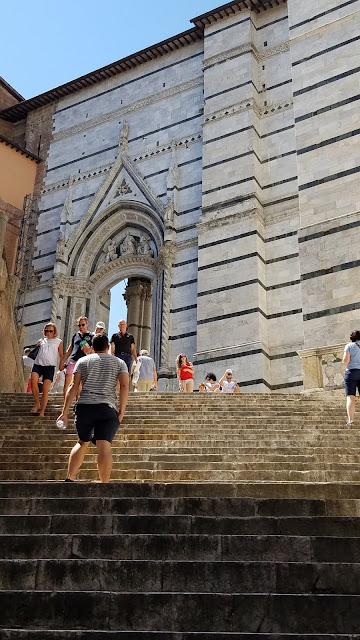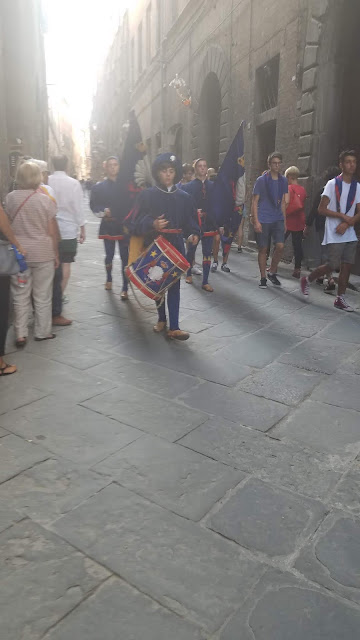 |
| Siena, a town founded by the Etruscans almost 3000 years ago, is home to Italy's most famous race, the Palio. |
 |
| The horse race consists of three laps around the Piazza del Campo in the center of town. The 650 year old Torre del Mangia looms over the square. |
 |
| There are two races each year: one July 2nd and one August 16th. 10 out of the 17 contradas, or neighborhoods, race at a time. The race is preceded by days of preparation with numerous practice runs that involve almost as much pageantry as race day. The kids came out and cheered on the jockeys during the second trial race two days before the actual race. |
 |
| The first "modern" Palio took place in 1633. |
 |
| The trial runs are far more enjoyable to attend than the actual Palio. |
 |
| The jockey for Oca (Goose), was Tittia, featured in the Netflix documentary. |
 |
| Goose also has the best street lights. |
 |
| After the trial the Contrada's supporters proceed back to their neighborhood. |
 |
| The city is full of song during the Palio period. |
 |
| This is the main song sung. The lyrics change based on which rival contrada is being insulted. |
 |
| The view from our Airbnb in the Tower contrada was excellent. |
 |
| The Duomo is on the left and San Domenico church is on the right. |
 |
| The old town is enormous and a walking tour of Italian architecture. |
 |
| Views from the Medici Fortress used by the family to subjugate Siena. |
 |
| The Medici coat of arms on the fort. |
 |
| No place is perfect I guess. |
 |
| Even the public libraries are ancient. |
 |
| The Basilica of San Domenico was built in the 14th century and houses St. Catherine of Siena's head. |
 |
| This is what they put her head in on special occasions. |
 |
| There are lots of great marcellerias in Siena. |
 |
| Another view of San Domenico. |
 |
| Up the steps to the Duomo. |
 |
| The Siena Duomo was also built in the 14th century. |
 |
| Adjacent to the Duomo is one of the world's oldest hospitals, the Santa Maria della Scala. It is now a museum. The della Scala aka Scaligeri family also ruled Verona for 200 years. |
 |
| Byzantine relics given to Siena by Venice. |
 |
| Frescos in the Pilgrim's Hall |
 |
| Of course Herod and the mean Jews have darker skin than the childbearing Jews... |
 |
| The "Children's Museum" was pretty disturbing. |
 |
| Every good European museum worth its salt knows the right mixture of classical and modern art. |
 |
| Fresco |
 |
| A picture of the old Siena Palio, when they used to kill bulls in the town square. |
 |
| As you are, I was. As I am, you will be. |
 |
| Altar in the museum. |
 |
| Chapel in the museum. |
 |
| More terrifying modern art. |
 |
| Painting on the side of the Palio cart in the museum. |
 |
| The bottom floor was chock full of Etruscan artifacts. There were also unmarked mass graves for those who died in the hospital. |
 |
| Etruscan artifact from the Tomb of the Infernal Chariot, discovered in Tuscany in 2003. |
 |
| Not very Roman... |
 |
| So many burial urns. |
 |
| It's hard to find a bad view in Siena. |
 |
| The Torre Contrada's mascot is an elephant. They have a plaza and communal building where they hold dinners and events. |
 |
| I wouldn't want to drive downtown. |
 |
| The later Palio trials draw a larger crowd. |
 |
| Some jockeys have better outfits than others. |
 |
| Another great building. |
 |
| Inside are many shops selling things no one needs. |
 |
| San Gimignano is a UNESCO site nearby where rival families built tall towers instead of racing horses. There are some good restaurants there, but it is also a tourist trap. |
 |
| And back to Siena! It's pretty clear where one contrada ends and another begins. Don't wear a rival contrada's banner in the wrong neighborhood. |
 |
| A Shell Contrada drummer bravely marches through another Contrada's territory. |
 |
| The Condottieri conduct a charge before the final Palio trial. |
 |
| Go see the Palio trials two days before. You'll thank me if you stay until the day before. |
 |
| Another great spot in Siena, La Prosciutteria. |
 |
| There is a church just covered with these things. |
 |
| The day of the Palio there is a historical parade that takes two hours longer than it needs to. The flag of Siena derives from the color of horses Remus's sons rode when they fled Rome. |
 |
| Send in the band. |
 |
| The Guilds march by. |
 |
| Siena is also home to some giant horses, not just race horses. |
 |
| Does anybody take the Snail Contrada seriously? |
 |
| Gigi from the Netflix documentary was racing for Shell. SPOILER ALERT: he fell again. |
 |
| Don't mess with Oca. |
 |
| Go Tittia. |
 |
| She-Wolf Contrada's warrior probably inspired the Hound. |
 |
| She-Wolf |
 |
| Nice helmets. |
 |
| The right banner on the Palio cart is awarded to the Contrada that wins the race. |




No comments:
Post a Comment